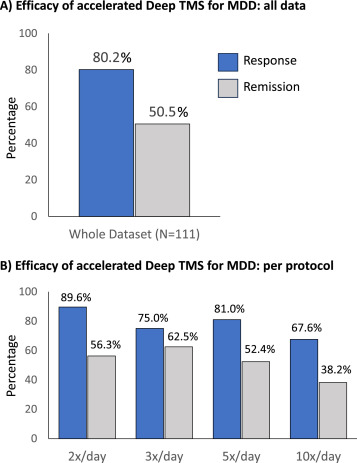Depression, and especially major depressive disorder (MDD) is typically a chronic condition—which means it requires chronic care. In recent years, this often means prescription antidepressants. However, understandably, many people want to decrease their dependency on Rx’s like antidepressants or safely stop their use (under the guidance of their doctors) entirely. Bella Vida may be able to help with options like transcranial magnetic stimulation (TMS).
According to a recent article published in the British Journal of Psychiatry Open, “long-term antidepressant use is tied to an increased risk of adverse outcomes, including cardiovascular disease (CVD), cerebrovascular disease (CV), coronary heart disease (CHD), and all-cause mortality.” Researchers analyzed a decade of data from UK’s Biobank, which included information on more than 220,000 adults. They looked at the odds of developing these conditions amongst those who were taking antidepressants and those who were not.
The team found that, after considering other pre-existing factors, those who took antidepressants were twice as likely to get CHD, CVD (along with CVD-related mortality), and had an increase in their all-cause mortality. They were also at a higher risk of CV. However, these figures do not tell the whole story.
Benefits of Treating Depression
On the plus side, those who used antidepressants also had a 23 percent lower risk of getting hypertension and 32 percent less likelihood to develop diabetes compared to their non-antidepressant-taking peers. However, this does not necessarily suggest that the antidepressant drugs themselves are responsible for lowering risks of hypertension and diabetes. Other factors, such as actually treating the depression (no matter the treatment) may be at play. The most common Rx antidepressants included SSRIs, trazodone, mirtazapine, duloxetine, and venlafaxine.
How to Treat Depression
Antidepressants are usually the first line of treatment for depression, and these are one of the most widely prescribed drugs in the world. In fact, 70 million prescriptions are typically written every year, which is twice as many as were prescribed 10 years ago. “This striking rise in prescribing is attributed to long-term treatment rather than an increased incidence of depression,” says the researchers.
There are few studies that assess the safety of antidepressants in the long-run simply because most are short-term studies. However, since depression is strongly linked to CVD risk factors, it is paramount that long-term cardiometabolic shifts with the use of antidepressants happen soon. Other factors that may inform the results also need to be more closely examined. In this study, the researchers accounted for demographics, socioeconomic status, biochemical/anthropometric/behavioral risk factors, overall health status, and disabilities. There were roughly equal numbers of men and women in the study, but 96 percent were white. This is a glaring oversight, and studies focused on non-white participants is essential in the future.
The Dependency on Drugs
At the end of the follow-up periods (five and ten years), about 7 percent of participants had been newly prescribed antidepressants. By far, the most common Rx was SSRIs at 81 percent. Of these prescriptions, the most common drug was citalopram, which was prescribed to nearly half of the new SSRI users. At five years of use, all antidepressants were linked with an increased risk of diabetes, all-cause mortality, and CHD. Simultaneously, these users also presented with a reduced risk of diabetes at this time.
A Better Option than Pills

TMS is a non-invasive form of therapy that may help with a variety of mental disorders including MDD and depression. It works via a magnetic field which is created at target areas of the brain.
Multiple sessions are initially needed, but impressive results have been shown to last for several months.
In a recent study published in Psychiatry Research, accelerated Deep TMS was administered to 145 MDD patients.
Overall, there was an 80% response and 51% remission rates in the whole dataset. This data set is not the only one showing success with TMS treatment.
The FDA has cleared TMS treatment for MDD and insurance companies are now covering some or most of the cost for TMS treatment. Treating the brain is becoming a better option than treating the symptoms and it is showing in the data.
External Reference links
- Psychiatry Research – Real world efficacy and safety of various accelerated deep TMS protocols for major depression
- NIH National Library of Medicine – Antidepressant use and risk of adverse outcomes: population-based cohort study
- Harvard Health – Transcranial magnetic stimulation (TMS): Hope for stubborn depression




